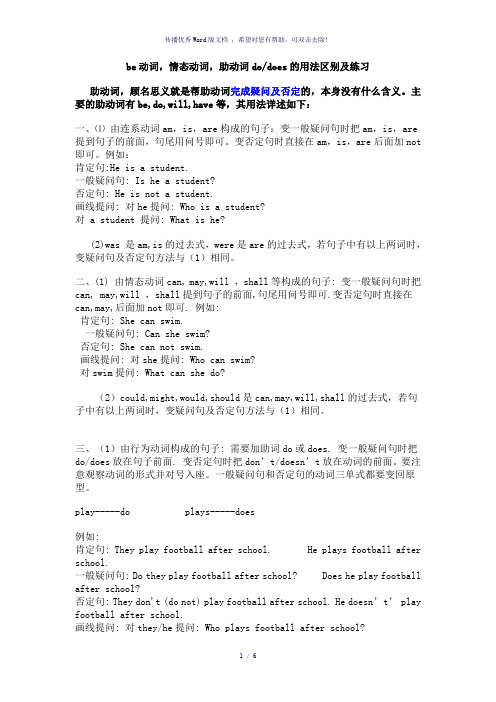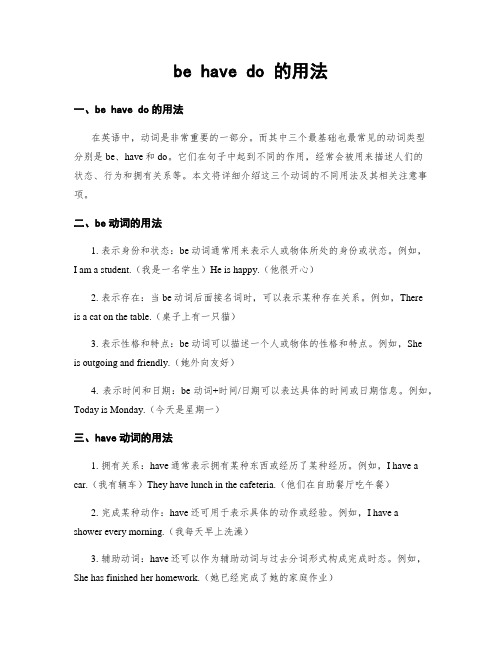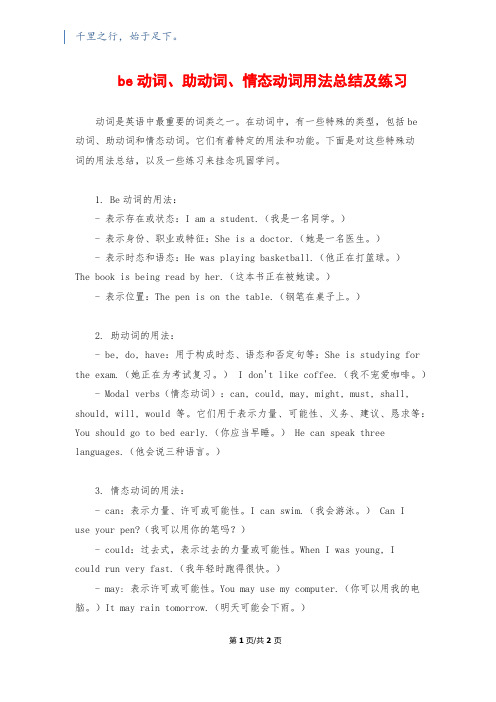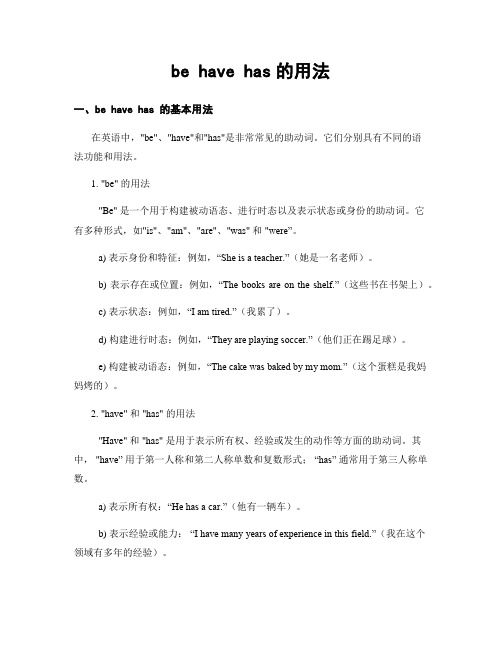be动词、have动词的用法及练习
人教版七年级上册英语动词分类及用法+练习

七年级英语动词分类及用法动词(v.): 一般情况下,按照作用和用途,英语动词可分为三类:be动词、情态动词,行为动词、助动词。
be动词表示状态, 情态动词表示说话人的情绪态度或看法,行为动词表示动作,助动词没有实际词意,只起语法作用。
一、be动词:英语中be动词也叫系动词,基本形式有am, is, are 三种。
其用法如下:我(I)用am,你(you)用are,is用于他(he),她(she),它(it);单数名词用is,复数名词全用are.变疑问,往前提,句末问号莫丢弃。
变否定,更容易, be后not莫忘记。
疑问否定任你变,句首大写莫迟疑。
be动词练习1. I ________ from Australia.2. She _______ a student.3. Jane and Tom _________ my friends.4. My parents _______ very busy every day.5. Where _________ you from?6._________ they your new friends?7. The girl______ Jack's sister.8. The dog _______ tall and fat.9. Jack’s friend ______ in Class One.10. Where _____ your mother? She ______ at home.11. Whose dress ______ this?12. That ______ my red skirt.14. These _____ buses.15. Some tea ______ in the glass.16. Gao Shan's shirt _______ over there.17. ______ David and Helen from England?18. We ____ friends.19. The two cups of milk _____ for me.20. The man with big eyes _______ a teacher.二、助动词:本身无实意,只有实意动词作谓语时才涉及使用,起到辅助作用。
助动词用法及练习

be动词,情态动词,助动词do/does的用法区别及练习助动词,顾名思义就是帮助动词完成疑问及否定的,本身没有什么含义。
主要的助动词有be,do,will,have等,其用法详述如下:一、⑴由连系动词am,is,are构成的句子:变一般疑问句时把am,is,are 提到句子的前面,句尾用问号即可。
变否定句时直接在am,is,are后面加not 即可。
例如:肯定句:He is a student.一般疑问句: Is he a student?否定句: He is not a student.画线提问: 对he提问: Who is a student?对 a student 提问: What is he?(2)was 是am,is的过去式,were是are的过去式,若句子中有以上两词时,变疑问句及否定句方法与(1)相同。
二、(1) 由情态动词can, may,will ,shall等构成的句子: 变一般疑问句时把can, may,will ,shall提到句子的前面,句尾用问号即可.变否定句时直接在can,may,后面加not即可. 例如:肯定句: She can swim.一般疑问句: Can she swim?否定句: She can not swim.画线提问: 对she提问: Who can swim?对swim提问: What can she do?(2)could,might,would,should是can,may,will,shall的过去式,若句子中有以上两词时,变疑问句及否定句方法与(1)相同。
三、(1)由行为动词构成的句子: 需要加助词do或does. 变一般疑问句时把do/does放在句子前面. 变否定句时把don’t/doesn’t放在动词的前面。
要注意观察动词的形式并对号入座。
一般疑问句和否定句的动词三单式都要变回原型。
play-----do plays-----does例如:肯定句: They play football after school. He plays football after school.一般疑问句: Do they play football after school? Does he play football after school?否定句: They don't (do not) play football after school. He doesn’t’ play football after school.画线提问: 对they/he提问: Who plays football after school?对play football提问: What do they do after school? What does he do after school?对after school提问: When do they play football? When does he play football?(2)did是do和did的过去式,变一般疑问句时把did放在句子前面. 变否定句时把didn’t放在动词的前面, 要注意观察动词的形式并对号入座。
be have do 的用法

be have do 的用法一、be have do的用法在英语中,动词是非常重要的一部分。
而其中三个最基础也最常见的动词类型分别是be、have和do。
它们在句子中起到不同的作用,经常会被用来描述人们的状态、行为和拥有关系等。
本文将详细介绍这三个动词的不同用法及其相关注意事项。
二、be动词的用法1. 表示身份和状态:be动词通常用来表示人或物体所处的身份或状态。
例如,I am a student.(我是一名学生)He is happy.(他很开心)2. 表示存在:当be动词后面接名词时,可以表示某种存在关系。
例如,Thereis a cat on the table.(桌子上有一只猫)3. 表示性格和特点:be动词可以描述一个人或物体的性格和特点。
例如,Sheis outgoing and friendly.(她外向友好)4. 表示时间和日期:be动词+时间/日期可以表达具体的时间或日期信息。
例如,Today is Monday.(今天是星期一)三、have动词的用法1. 拥有关系:have通常表示拥有某种东西或经历了某种经历。
例如,I have a car.(我有辆车)They have lunch in the cafeteria.(他们在自助餐厅吃午餐)2. 完成某种动作:have还可用于表示具体的动作或经验。
例如,I have a shower every morning.(我每天早上洗澡)3. 辅助动词:have还可以作为辅助动词与过去分词形式构成完成时态。
例如,She has finished her homework.(她已经完成了她的家庭作业)4. 表示某种关系:have还可用来表示某种关系或状况。
例如,We have a good relationship with our neighbors.(我们与邻居有良好的关系)四、do动词的用法1. 表示行为和活动:do通常被用来描述具体的行为或活动。
be动词、助动词、情态动词用法总结及练习

千里之行,始于足下。
be动词、助动词、情态动词用法总结及练习动词是英语中最重要的词类之一。
在动词中,有一些特殊的类型,包括be动词、助动词和情态动词。
它们有着特定的用法和功能。
下面是对这些特殊动词的用法总结,以及一些练习来挂念巩固学问。
1. Be动词的用法:- 表示存在或状态:I am a student.(我是一名同学。
)- 表示身份、职业或特征:She is a doctor.(她是一名医生。
)- 表示时态和语态:He was playing basketball.(他正在打篮球。
)The book is being read by her.(这本书正在被她读。
)- 表示位置:The pen is on the table.(钢笔在桌子上。
)2. 助动词的用法:- be, do, have:用于构成时态、语态和否定句等:She is studying for the exam.(她正在为考试复习。
) I don't like coffee.(我不宠爱咖啡。
)- Modal verbs(情态动词):can, could, may, might, must, shall, should, will, would等。
它们用于表示力量、可能性、义务、建议、恳求等:You should go to bed early.(你应当早睡。
) He can speak three languages.(他会说三种语言。
)3. 情态动词的用法:- can:表示力量、许可或可能性。
I can swim.(我会游泳。
) Can Iuse your pen?(我可以用你的笔吗?)- could:过去式,表示过去的力量或可能性。
When I was young, Icould run very fast.(我年轻时跑得很快。
)- may: 表示许可或可能性。
You may use my computer.(你可以用我的电脑。
be动词用法和练习题

be动词用法和练习题以下是 be 动词用法和练习题:be动词用法:be 动词是英语中最常用的动词之一,它在句子中的作用是表示主语的状态或特征。
be 动词的形式有 am, is, are, was, were,根据主语的单复数和时态的不同进行变化。
下面是 be 动词在不同时态中的用法:1. 现在时am:用于第一人称单数,例如 I am a student.is:用于第三人称单数,例如 He is a teacher.are:用于第二人称和第三人称复数,例如 You are my friends. They are singers.2. 过去时was:用于第一、三人称单数,例如 I was happy. She was there.were:用于第二人称和第三人称复数,例如 You were late. They were busy.3. 将来时will be:用于所有人称,例如 I will be there. You will be happy. He will be busy.4. 现在进行时am/is/are being:用于所有人称,例如 I am being careful. She is being kind. They are being helpful.5. 过去进行时was/were being:用于所有人称,例如I was being silly. They were being lazy.练习题:1. They _______ eating lunch now. (现在时)答案:are2. He _______ a famous singer. (现在时)答案:is3. I _______ happy yesterday. (过去时)答案:was4. They _______ friends in high school. (过去时)答案:were5. She _______ here tomorrow. (将来时)答案:will be6. We _______ studying English right now. (现在进行时)答案:are being7. He _______ a party last night. (过去时)答案:had8. I _______ a meeting tomorrow morning. (将来时)答案:will have9. They _______ lazy last weekend. (过去时)答案:were10. The children _______ ice cream now. (现在时)11. She _______ a new job next month. (将来时)答案:will have12. I _______ happy with my new job. (现在时)答案:am13. They _______ working on a project all day. (现在进行时)答案:are being14. We _______ a great time at the party last night. (过去时)答案:had15. He _______ his homework right now. (现在进行时)答案:is doing16. She _______ very excited about the concert next week. (将来时)答案:will be17. I _______ to the gym every day. (现在时)答案:go18. They _______ a long walk in the park yesterday. (过去时)答案:took19. We _______ a vacation next month. (将来时)20. The sun _______ in the east and _______ in the west. (一般现在时) 答案:rises, sets。
be have has的用法

be have has的用法一、be have has 的基本用法在英语中,"be"、"have"和"has"是非常常见的助动词。
它们分别具有不同的语法功能和用法。
1. "be" 的用法"Be" 是一个用于构建被动语态、进行时态以及表示状态或身份的助动词。
它有多种形式,如"is"、"am"、"are"、"was" 和"were”。
a) 表示身份和特征:例如,“She is a teacher.”(她是一名老师)。
b) 表示存在或位置:例如,“The books are on the shelf.”(这些书在书架上)。
c) 表示状态:例如,“I am tired.”(我累了)。
d) 构建进行时态:例如,“They are playing soccer.”(他们正在踢足球)。
e) 构建被动语态:例如,“The cake was baked by my mom.”(这个蛋糕是我妈妈烤的)。
2. "have" 和 "has" 的用法"Have" 和 "has" 是用于表示所有权、经验或发生的动作等方面的助动词。
其中,"have” 用于第一人称和第二人称单数和复数形式;“has” 通常用于第三人称单数。
a) 表示所有权:“He has a car.”(他有一辆车)。
b) 表示经验或能力:“I have many years of experience in this field.”(我在这个领域有多年的经验)。
c) 表示发生的动作:“They have dinner at 7 o'clock every day.”(他们每天晚上七点吃饭)。
be和have的用法

be和have的用法一、be的用法1. 动词be是英语中最常见的动词之一,表示存在、状态或身份。
它的形式多样,包括is、am、are(现在时)、was、were(过去时)等。
2. 表示身份或职业:如I am a teacher.(我是一名教师。
)3. 表示存在:如There is a cat in the garden.(花园里有只猫。
)4. 描述性用法:be可以用来描述人或事物的特征、性质或状态。
a) 形容词作表语:She is tall and beautiful.(她又高又漂亮。
)b) 名词作表语:The book is on the table.(书在桌子上。
)c) 副词作表语:He is here.(他在这里。
)二、have的用法1. 动词have表示拥有或经历某种事物。
2. 表示拥有:have可以指具体或抽象的物品,也可以指身体部位等。
a) 具体物品:She has a new car.(她有一辆新车。
)b) 抽象概念:They have a lot of knowledge about science.(他们对科学有很多了解。
)c) 身体部位:I have a headache.(我头疼。
)3. 用于描述经历、感受或动作。
a) 经历:I have been to Europe.(我去过欧洲。
)b) 感受:He has a great time at the party.(他在聚会上玩得很开心。
)c) 动作:We have a meeting tomorrow.(我们明天开会。
)三、be和have的强调形式除了常规用法外,be和have可以通过添加助动词或使用其他语法结构来强调意思。
1. be的强调形式:a) 表示习惯或性质:She is always late for class.(她总是上课迟到。
)b) 表示目的、原因或结果:The book is to help you study better.(这本书是帮助你更好地学习的。
be动词和have的用法

be动词和have的用法一、了解be动词的基本用法在英语中,be动词是一个非常重要且常用的动词。
它具有多种形式,包括am、is、are、was和were等。
下面将详细介绍be动词的各种用法。
1. 表示存在或位置:Be动词可以用来表达存在或位置。
比如:- There is a book on the table.(桌子上有一本书)- The cat is under the bed.(猫在床底下)2. 描述特征或状态:Be动词还可以用来描述人物、物体或事物的特征和状态。
例如:- She is intelligent and diligent.(她聪明勤奋)- The house is old but spacious.(这所房子古老但宽敞)3. 表示身份或职业:Be动词也常被用于表示人们的身份或职业。
例如:- I am a teacher.- He is an engineer.4. 表示时间和日期:Be动词可以与表示时间和日期的名词连用,表达具体的时间点或日期。
例如:- It is 9 o'clock in the morning.- Today is Monday.5. 构成进行时态:Be动词配合进行时态,表示正在进行的动作。
例如:- They are playing football in the park.- We were studying English last night.二、掌握have的常见使用方式除了be动词外,另一个常用的动词是have。
以下将介绍have动词的几种常见用法。
1. 表示拥有:Have可用来表示某人或某物拥有某样东西。
例如:- I have a car and a bicycle.- They have three children.2. 表示经历:Have还可以表示经历某件事情或遭遇到某种状况。
例如:- She had a wonderful holiday in Bali.- We have had some difficulties in the past.3. 表示进行某种活动:Have也可用于表示进行某种活动。
- 1、下载文档前请自行甄别文档内容的完整性,平台不提供额外的编辑、内容补充、找答案等附加服务。
- 2、"仅部分预览"的文档,不可在线预览部分如存在完整性等问题,可反馈申请退款(可完整预览的文档不适用该条件!)。
- 3、如文档侵犯您的权益,请联系客服反馈,我们会尽快为您处理(人工客服工作时间:9:00-18:30)。
【巩固练习】I. 用动词的正确形式填空:1. -_____ Jack _______ (have)any bread ?-No , he _______.2. I _____ ______ any pears . (not have). But Mary ______ some . (have)3. Maria ______ ______ any (not have)eggs.4. _____ Alice and Tina ______ any fish ? No , they ______ . (have)5. ______ Tom’s cat ______ milk ? No , it _______ . (like)6. What ______ you _____ in your backpack ? (have)7. ____ you _____ bananas ? (like)8. This ____ my pen pal Jim . (be)9. What language _______ you ______ ? (speak)10. My mother ____ _____ TV now . (watch)11. We _____ _______ Japanese at school . (not , study )12. He _______ _______ playing football . (not , like)13. What time ______ they usually ______ up ? (get)14. ______ your father _____ in that factory ? (work)II. 判断下面句子的正误,并改正。
1. Where do you from ? ()______________________2. What kind of food does your mother like ? ()_________________________3. I’m not live in Beijing . ()_________________________4. My pen pal want to come here this September . ()_________________________5. The twins doesn’t like thrillers . ()_________________________6. My cousin don’t want to go to a movie . ()_________________________7. Do your parents likes salad ? ()_________________________8. Does Jim and Mary in the same class ? ()_________________________III. 句型转换:1. School st arts at 8 o’clock in the morning . (改为一般疑问句)____ school _____ at 8 o’clock in the morning ?2. My grandpa does sports every day . (改为否定句)My grandpa _____ ______ sports every day .3. How do you go to school ? (完成答句)I _____ to school by bike .4. Lin Hai works hard . (改为否定句)Lin Hai _____ _______ hard .5. My pen pal comes from Brazil . (就划线部分提问)______ ______ your pen pal ______ _______ ?6. Maria can speak Chinese and French . (就划线部分提问)______ ______ ______ Maria speak ?7. Uncle Bob has a big apartment . (改为一般疑问句)_____ Uncle Bob ______ a big apartment ?8. My grandma likes nice and vegetables for dinner . (就划线部分提问)_______ _______ your grandma like for dinner ?9. Rick likes math because he thinks it is interesting . (就划线部分提问)______ ______ Rick _____ math ?10. What time does Tom usually go to school ? (回答问题)He usually _______ to school _______ 7 o’clock .IV. 用括号中适当的词填空:1. Li Mei usually ______ (come , coming , comes)to school early .2. My English teacher ______ (is , plays , play)tennis well .3. _____ (Is , Do , Does)there a cinema in this area (地区)?4. _______(Are , Does , Do)they speak , English in Brazil ?5. It _______ (isn’t , don’t , doesn’t )often snow in winter .6. The girl _______ (go , goes , going)home at 4:30 in the afternoon .V. 选择填空:()1. Tom is a worker . He _____ in a factory . His sisters _____ in a hospital.A. work , workB. works , workC. work , works()2. Who ______ English best in your class ?A. speakB. speaksC. speaking()3. We _______ music and often _____ to music .A. like , listenB. likes , listensC. like , are listening()4. On Sunday he sometimes _____ his clothes and sometimes _____ some shopping.A. wash , doB. is washing , is doingC. washes , does()5. The twins usually _______ milk and bread for breakfast , but Jim ______ some oranges for it .A. have , haveB. have , hasC. has , haveVI. 用括号中所给动词的适当形式填空:Wang Lin 1 (be)a schoolboy . He 2 (live)in Beijing . He 3 (study)in a middle school.Wang Lin 4 (get)up at half past five every day . After that he 5 (read)English and Chinese . He 6 (have)breakfast at seven . Wang Lin 7 (go)to school six days a week . In class he 8 (listen)to the teacher carefully and his teachers 9 (like)him very much .VII. 阅读理解:(A)Mr. Brown is a very old man . Every morning he goes for a walk in the park . And he comes home at twelve thirty for his lunch .But today a car stops at his house at twelve o’clock . Two policemen help him get out . One of them says to Mr. Brown’s daughter :“The old man can’t find his way in the park . He asks us to take him home in the car . ”The daughter thanks the policemen and they leave . Then she asks his father : “Dad , yougoes to that park every day . But today , you can’t find the way . What’s wrong with you ? ”The old man smiles like a child and says : “I can find my way . I don’t wan t to walk home , you know . ”()1. Every morning Mr. Brown often comes home at _____.A. twelveB. elevenC. twelve thirtyD. twelve ten()2. Today Mr. Brown comes home by _____.A. busB. carC. bikeD. boat()3. The policeman says Mr. Brown ________ in the park.A. doesn’t want to walk homeB. can’t find his wayC. find his wayD. knows the way()4. Mr. Brown’s daughter thinks ______.A. he wants to go homeB. he wants to have lunch earlyC. he doesn’t want to go to the parkD. something is wrong with him()5. Mr. Brown has lunch ______.A. in the parkB. at homeC. in the carD. at twelve(B)Tom lives and works in London . He works hard from Monday to Friday . On Saturday and Sunday he doesn’t go to work . Sometimes he goes shopping . Sometimes he goes to see his friends . This week he is going to Birminghan (伯明翰市)with his good friend Mike . They are going to see their friends there . This is what they are going to do .They are going to take the 2:40 train on Friday afternoon . In Birminghan , Tom’s friend , Jack is going to take them home in his car . Tom and Mike are going to stay with Jack for the weekend .On Saturday morning Jack is going to take them to a middle school . Mike’s friend , Mr . White is a teacher there .On Sunday , Jack is going to take them to some nice parks in Birminghan . They are going to take the 6:00 train back to London .()1. On ______ afternoon Tom and Mike are going to take the 2:40 train .A. FridayB. SaturdayC. SundayD. Monday()2. Jack is going to ______ them home in his car .A. carryB. look afterC. meetD. take()3. Mr. White is a ________ of a middle school.A. studentB. teacherC. classmateD. pupil()4. Tom and Mike are going to ______ with Jack for the weekend .A. liveB. stayC. talkD. ride()5. Tom and Mike are going to take the _______ train back to London .A. 7:00B. 6:00C. 6:30D. 7:30【练习答案】I.1. Does , have , doesn’t2. don’t , have , has3. doesn’t , have4. Do , have , don’t5. Does , like , doesn’t6. do , have7. Do , like 8. is9. do , speak 10. is , watching11. don’t , study12. doesn’t , like13. do , get 14. Does , workII.1. do 改为are2. √3. in 改为do4. want后加s5. doesn’t 改为don’t6. don’t改为doesn’t7. likes改为like 8. Does改为DoIII. 1. Does , start 2. doesn’t , do3. go4. doesn’t , work5. Where , does , come , from6. What language (s)can Maria speak ?7. Does , have 8. What ,does9. Why , does , like10. goes , atIV. 1. comes 2. plays 3. Is 4. Do 5. doesn’t 6. goes V. 1. B 2. B 3. A 4. C 5. BVI. 1. is 2. lives 3. studies 4. gets 5. reads 6. has 7. goes 8. listens 9. likeVII. A. 1-5 CBBDBB. 1-5 ADBBB猜谜语:答案是:the back of your head。
